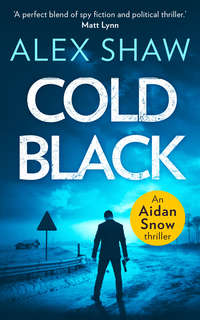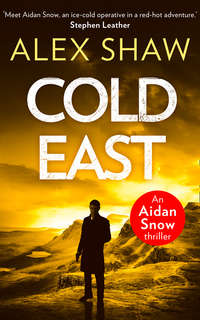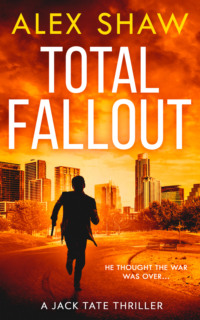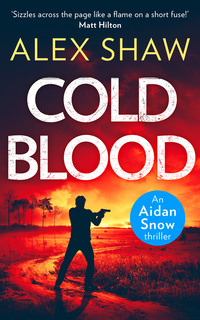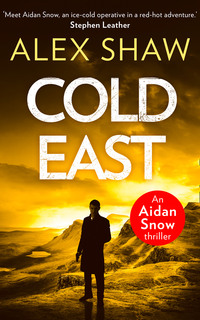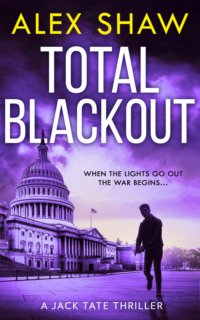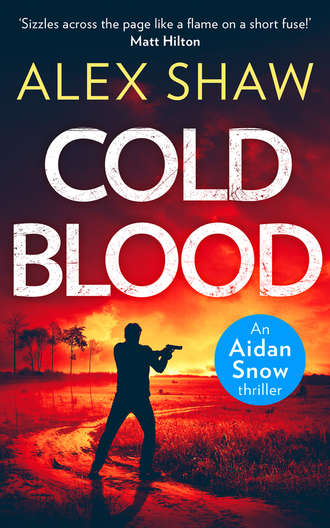
Полная версия
Cold Blood
‘Everyone has, you slapper!’ Dale shouted.
At the front of the class, Arnaud took a deep breath. ‘That is enough!’ He slammed the French textbook on the desk and glared at the offending class members. ‘I have asked for silence and I will not ask again!’ A hand went up at the back of the class. ‘Yes, Danny?’
‘Which page we on, mister?’ Danny replied with a cherubic expression.
Arnaud paused and inwardly sighed before answering. ‘Page sixty-nine. Le Weekend.’
There were sniggers around the room. ‘That’s when Sam does her French, sir – at the weekend,’ shouted Danny across the classroom.
‘Twat!’ Sam put down her compact and raised her middle finger.
‘Stand up.’
There was a pause and Sam, a heavily made up girl, her hair streaked bleach-blonde, stood up. Arnaud looked her in the eye she held his gaze. ‘Wot?’
‘What do you mean, “wot”?! I will not tolerate that kind of language in my French class!’
‘But it is French, mister,’ shouted Dale
‘And she is a slapper, sir!’ added Danny.
Sam threw her textbook at the two boys. ‘Wankers!’
‘Get out. Just get out.’ Arnaud was turning red. Unbelievable, unbelievable.
Making as much noise as possible, Sam pushed her table away, scooped up her bag and left the room. Slamming the door, she added, ‘I am twatting going!’
Danny and Dale looked at each other, Danny raising his right fist and Dale hitting it with his own. They were enjoying this, their weekly game of wind up the ‘gay teacher’, made all the better if they could also piss off Sam Reynolds. Danny leant back in his chair and put his feet up on the table and Dale opened a can of Coke. Arnaud, facing the whiteboard, was oblivious of this and continued to calm his breathing, writing the page number, date and title in his neatest handwriting. He would report this behaviour once the lesson was over; Sam was already on report and would be internally excluded for her outburst. Behind him the noise level in the class started to grow. He was about to turn around again and give them another telling off when suddenly it stopped.
‘Put your feet on the floor, and you… put that can in the bin.’ The man at the door looked at Arnaud, a stern expression on his face. ‘Let me know the names of the ones who’ll be picking up litter at lunchtime.’
Arnaud returned with an equally stern face of his own, ‘Will do, Mr Middleton.’
Middleton nodded, glowered again at Danny and Dale, and shut the door. Outside he could be heard shouting. Arnaud let out a sigh, sat at his desk and opened his book.
‘Le weekend. Can anyone tell me what that means in English?’
The remainder of the lesson was only slightly less chaotic. Sam returned after having been spoken to by Middleton and sat solemnly at the front, refusing to work and doodling, while Danny and Dale were quiet because they were listening to their iPods. In fact, the only pupils working were the six on the front two rows. At ten-fifty the bell sounded and there was a sudden mass exodus. Chairs were left upturned and books lying on tables. Arnaud sighed heavily and made a note on Sam’s report. She looked at it and then at him with a face full of hate, before she, too, left. This wasn’t what teaching was meant to be like. He bent down to pick up a sweet wrapper and got a handful of sticky chocolate for his trouble. He wiped his hand on a piece of A4 paper and collected up the French textbooks.
Twenty minutes for break, then another two hours until lunch, and finally a free period for lesson five. Unless they gave him another cover! Two more Year Nine classes and then a bottom-set Year Ten. Now he knew why the government had paid him to train as a teacher! Still, he was nearly at the end of his NQT year and would be a fully qualified, respected teacher in September.
He shut the door and locked it behind him. Instantly, he was banged into as pupils pushed past in an attempt to get to the canteen and gorge on junk food as soon as was humanly possible.
He had grown immune to the knocks now. Arnaud had been at Horley Community College for almost two years, first as a student, when he was given easier classes, and then as an NQT – newly qualified teacher. The school had offered him a job and he, like a fool, had accepted it. ‘Best to work in a difficult school – baptism of fire, as it were,’ his mentor had told him. Yeah, right. At least it was a nice day outside, which was probably why the kids were so fidgety. He couldn’t blame them. Who would want to be inside concentrating on French grammar or asking how much for a kilo of pommes when, just through the window, the summer had truly arrived?
One more week, he kept telling himself, and then the summer holidays and unemployment. Well, not quite. Having given a term’s notice, his contract would finish at the end of August and the school had said there would be supply work for him if he still hadn’t found anything. Supply work, in Horley? He laughed to himself as he entered the staffroom; Beirut sounded safer.
Arnaud sat wearily in the worn easy chair that occupied the corner of the room. Around him, teachers scurried to get as much coffee as their break would allow. He spotted the sexy blonde student teacher he’d seen on the train and wished her into the vacant seat next to him. It didn’t happen. She sat between two fit-looking men in shorts. P.E. teachers! Puh! He sipped his hot coffee and burnt his tongue. Bugger.
‘Heard any more about that job you applied for?’ the Head of Foreign Languages, Richard Middleton, asked as he sat down heavily.
‘Not yet.’
‘Kyiv, wasn’t it?’
‘Yes.’ He moved his tongue inside his mouth, feeling the burn.
‘Ah, did you know that Kyiv is the birthplace of modern Russia?’
‘No.’ Arnaud turned in his seat.
‘Kyiv-Rus was the original capital of Russia almost a thousand years ago, long, long before the Tsars, the Bolsheviks and the Communists popped up. Back then it was populated by nomadic tribes.’
Arnaud was impressed. ‘Did you study Russian history at uni?’
Middleton smiled. ‘No. I saw it on the Discovery Channel.’
Odessa Oblast, Ukraine, near the Transdniester border
Bull looked through the kite sight. Nothing yet. He and his Brigada were watching and waiting. If all went to plan, this would be the first step. He shivered in the cold of the pre-dawn. It brought back memories of a lifetime ago…
The chill of the Afghan night had all but disappeared, to be replaced by the weak warmth of dawn. In the half-light, the poppy field stretched ahead of them and west on the valley floor. A beautiful flower to some, but to others as deadly as any bomb. To the east, the unnamed village with its ramshackle huts. Bull lowered his binos and rubbed his eyes.
His Spetsnaz assault group had been given specific orders: attack the village, eliminate all Mujahedeen, burn the poppy crop. His men, the true elite of the Red Army, were ready. They lay prone on the ridge, waiting. To Bull’s left and hidden in a dip, Captain Lesukov’s fire-support team had their mortars ready; to his right were Lieutenant Gorodetski, Sergeant Zukauskas and the rest of the Brigada. The plan was simple, brutal and effective. Lesukov’s men would commence shelling of the village, and then Bull’s team would move from house to house, picking off anyone and everyone who survived. Intelligence supplied by a local informant had said the village was a sham, nothing more than a base for Mujahedeen fighters and Arab Islamic mercenaries to grow and distribute the death that came from the poppy in the field. The Red Army could not let this continue in a ‘partner state’. Hence the unequivocal orders. Bull looked at Lesukov. ‘Start firing your mortars in two minutes.’
Lesukov nodded. ‘Good luck.’
Bull smiled. ‘Ivan, we are Spetsnaz. We make our own luck.’
Bull’s men moved silently over the ridge and into the valley. Thumph. Thumph. Mortar shells whistled through the sky. There was sudden movement from the village. A robed figure appeared and looked directly at the ridge. He yelled, raised his rifle and fired into the sky. As he did so, an explosion tore the very earth from under his feet. More shells landed, flattening the Afghan houses and destroying the beauty of the new day. Then, as abruptly as they had started, they stopped.
Bull’s men now swept through the carnage before them. The dead and dying littered the village; many had been asleep, others in the process of grabbing weapons. Several had fled to the fields and were chased down by rounds not even the fastest could outrun. Bull reached the building he knew housed the village elder. The roof was intact even though part of one wall was now missing. The old man was sitting on a crimson rug in the corner, his henna-red beard specked with dust. His eyes angry, he showed no fear. He waited until Lieutenant Gorodetski had entered the room behind Bull before speaking words of venom.
‘He says it is a trap; that we have all been tricked,’ Gorodetski translated. The old man jabbed at them with a bony finger. Gorodetski continued. ‘He says we are infidels, not men of our word, not men of honour.’
‘Enough.’ Bull stepped forward and crouched. ‘We are men of honour. We did not break our agreement.’ Drawing his revolver, Bull shot the elder in the face.
Shocked, Gorodetski looked down at his captain. ‘Why?’
Pashinski stared at the young officer. ‘He was Mujahedeen; that is all you need know.’
An explosion behind, then another. Bull turned as Gorodetski backed out of the house. On the ridge above, the fire-support team were under attack. Gathering up his Brigada, Bull charged back towards Lesukov’s team. Reaching the ridge, wild rounds whistled past them. Lesukov’s men had been taken by surprise; a group of fighters numbering more than twenty had flanked them from the west. Lesukov fired controlled bursts from his Kalashnikov at the Afghan hordes. Of the team of eight, only he and two others were left.
Zukauskas grabbed a mortar and turned it around to face the oncoming threat; one-handed, he dropped a mortar into the tube and fired. Unsighted, the bomb flew over the Mujahedeen and landed harmlessly, save for an explosion. Securing the tube on the ground, he sighted it while Gorodetski dropped in a new shell. This time the explosion landed just to the left of the advancing fighters. Some stopped, others carried on.
Bull joined Lesukov. There was a grin on Lesukov’s face. ‘We make our own luck!’
‘No. We make it unlucky for them!’
A sound from below brought Bull very much back to the present. He raised the kite sight and saw three trucks moving slowly along the rural road. Shifting his weight slightly he looked to his left and could make out the hunched figures of the militia’s SOCOL Eagle unit further down the incline in front of him. His lips formed a serpent-like smile as he depressed the switch on his covert transmitter twice. Seconds later, his ready signal was acknowledged by three bursts of static in his earpiece.
On the valley floor the lead truck slowed and stopped. The driver stepped out and made a show of kicking the tyre in disgust. The two remaining trucks concertinaed and also stopped. Soon all three drivers were inspecting the ‘guilty tyre’. In the green haze of the night scope there was movement again as a larger but solitary truck appeared on the horizon, heading directly towards the convoy from the opposite direction. It joined them and the driver greeted his fellow truckers warmly and offered his help and advice.
As Bull had hoped, the stationary convoy made too good a target to pass up. The armed members of the SOCOL appeared on the road below and advanced towards the drivers, weapons up. The second SOCOL group on the hill now stood and started down the incline on a ninety-degree approach to the target. Bull pressed his switch again. SOCOL’s ‘plan’ was going to plan. Here, twenty kilometres inside the Ukrainian border, they would intercept the latest arms shipment and punch a hole in this smuggling route. That was, until…
Bull’s sign was met this time by two short, static bursts. From above and to the right, his men opened fire. A tracer flew towards the descending SOCOL ‘cut off’ group. Four fell without even knowing where their executioners were. The remaining two flung themselves down on the barren hillside and scrambled for the smallest piece of cover. On the road, the intercept team had just enough time to train their weapons. The lieutenant, whose reactions had been surprisingly rapid, managed to get off a single, low-velocity round from his pistol, which struck Driver Two square in his concealed Kevlar breastplate. Staggering back, he had fallen as Drivers One and Three let rip with armour-piercing rounds from short-barrelled AKs, all but cutting the officer in half. Further shots sought out the two attackers on the hill and the engagement was over within a minute. Like the Poznan anti-terrorist police a decade before, the Ukrainian SOCOL had met the Soviet Red Army Spetsnaz and lost. Bull stood, walked down the hill and joined his Brigada. The first part of his business deal had just gone through. He exchanged congratulatory glances with his men and retrieved a satellite phone from a padded pocket.
Tiraspol, Transdniester
Ivan Lesukov sat in the sauna and sweated. ‘You have done well, my friend. And the other half of the bargain? You are a real man of your word, Bull.’ He shut his flip phone and placed it on the wooden plank next to him.
‘They have done it?’ Arkadi Cheban was anxious to know.
Lesukov beamed. ‘Yes, they have. The shipments will no longer be hampered by those Ukrainian “heroes”.’
‘That is great news, Uncle.’ Cheban used the term as a sign of respect. Lesukov was actually the uncle of his wife. He had married into the business, leaving his days of being an interpreter behind.
Lesukov wiped his brow and looked at the younger man. He was ready. ‘We are expanding on all fronts, Arkadi, and I have a job for you.’ He noticed Arkadi’s narrow chest swell with pride. ‘I want you to organise our deliveries in London. Who knows, you may even be able to import chairs.’ He tapped his nose.
Arkadi was ecstatic; he had been dreaming of permanently leaving this joke of a country for as long as he could remember. When he’d been ordered back from England by his uncle, he’d thought perhaps he’d done something wrong and even debated whether to return or not. He had, after all, only been there for three months. On the contrary, however, ‘Uncle’ had been impressed. ‘Thank you, Uncle.’
‘I know how much you will miss Yulia but trust me… she will be able to join you soon.’
In fact, during his time in London, Arkadi hadn’t missed his wife at all. He was quite taken with the Polish girl who worked in the local coffee shop. ‘I do hope so, Uncle; it is lonely without her.’
Lesukov liked this. Having no children of his own, his sister’s daughter was very dear to him and he would have killed anyone who didn’t treat her with respect.
Arkadi changed the subject. ‘Why is Pashinski called “The Bull”?’
Lesukov held up his finger. ‘When we were young conscripts together, about your age, we had a very stupid sergeant who asked Tauras his name. When he replied, the man asked him if he was a bull – like the star chart. I do not know why this offended him but Tauras hit him. You see, the sergeant did not like Lithuanians. Tauras was beaten and left outside in the snow, tied to a post, for three days. A month later the sergeant disappeared on a training exercise. For my part, I think he is more like a venomous snake.’
Chapter 3
Fontanka, Odessa Oblast, Ukraine
The best rooms were, of course, on the thirtieth floor. Here the penthouses had floor-to-ceiling glass walls that gave fantastic views of the landscaped gardens and private beach. The top five floors were VIP class with private clubrooms. Every room in the hotel had both a sea and inland view as the structure curved like a giant wave. The hotel was indeed fantastic, or would be, Varchenko reminded himself, once it was built. Yes. The architect had done a great job of transferring his vision from idea to plans to scale model. Now, it was the foreigners he needed to turn the model into reality, for his wealth alone could not bankroll this venture. A man of the world, he liked to think, since 1991 he had travelled to the best resort and gaming hotels in the world. This hotel would not be Nice’s Hotel Negresco; it would not be Las Vegas’s Caesar’s Palace, New York’s Four Seasons, the Sandy Lane of Barbados, London’s Ritz or Dubai’s Burgh Al Arab. This would be the Hotel Noblesse, and it would be his.
Meetings had been arranged with venture capitalists in London, New York, Zurich and Vienna. He had brought, at his own cost, potential partners to Ukraine. The diving would rival Egypt (they would make a fake reef), the service would be seven-star. This would be the new principality of the twenty-first century and he would be the new prince!
Although he had a tear in his eye and the vodka bottle was empty, he was not a dreamer. Valeriy Varchenko stood, patted the roof of his hotel, and retired for the evening.
Odessa, Southern Ukraine
Sergey Gorodetski threw the grappling hook over the ledge of the warehouse, making sure it was fast before carefully hauling himself up the wall and onto the roof. He paused, counted to a hundred and, when he heard no sounds of alarm or noises from below, worked his way forward on the gravelled roof, all the while making sure to keep his body below the skyline. On reaching the edge of the roof, he leaned against the parapet and removed his rifle from its canvas carry case. He inspected it for dirt before looking down the sight to check for misalignment. Making the necessary adjustment, he carefully chambered the first round. It was two-forty-five and he had exactly five hours to wait for his prey, who was, by his very nature, a creature of habit.
Jas Malik pulled his trench coat around his body and stepped into the back of the Lexus. Ruslan had kept him waiting. Today’s excuse: the local militia refused to let him turn right… or something. Jas didn’t care why he was late, just that he was. Jas did not like this. His father had taught him the value of punctuality at an early age in Islamabad when he’d whipped him for having the audacity to be late for the family stall. Casting Ruslan a stern look, he urged him to ‘bloody hurry up and get him to the factory’.
‘Yes, sir,’ replied the bemused Ukrainian.
‘I have to open the factory at seven-forty-five, no later,’ he ordered, shooting Ruslan a glare before transferring his attention to the heavy lifting cranes of the Odessa docks.
Ruslan slumped over the wheel and made faces in the mirror only he could see. A veteran of Afghanistan, he didn’t suffer fools, such as Jas, gladly, but the fool paid his boss well. Besides, he got to drive this big Lexus and the women loved it.
Seven-twenty. Sergey took up his trigger position on the factory car park. He was invisible to those below unless they made the fatal mistake of staring directly up. Experience and training had taught him patience. What was that English saying his training instructor had told him? Ah, yes: ‘Slowly, slowly, catchy monkey.’ Never before had the saying made so much sense. His eyes started to water and blur his vision. He squeezed them shut and opened them again, blinking, fighting the urge to rub. He would not take his eyes off the trigger position, not now, not after what felt like years of waiting. He would do this now, and he would do it perfectly.
Jas liked the journey to the factory. Speeding past the mainly Soviet-era traffic, made up of Ladas, Volgas, Kamaz trucks and the odd Jigoli, he felt he had really arrived. He allowed himself to smile as he recalled the look he had seen on the faces of the so-called ‘old men’ of the business when he announced his successful bids for hitherto secretive state tenders in Ukraine, Belarus and Russia. Let the corporate Germans in Erlangen call him a tin-pot Paki now!
A car engine approached and Sergey made his final adjustments. The dark-blue Lexus rounded the corner of the warehouse and drew to a halt in front of the main entrance. Sweat formed on his brow despite the unseasonably chilly morning as he concentrated on the crosshairs of the Dragunov’s sight. The door opened and the target started to rise. Let him get out, don’t rush… apply second pressure to the trigger. The single shot flew along the barrel and covered the short distance to the target. There was a crack and suddenly a cloud of blood. The target was propelled backwards, striking the rear panel of the limousine before hitting the ground. The driver momentarily froze before throwing himself to the floor and scrabbling behind the car for cover.
British Embassy, Kyiv, Ukraine
Vickers frowned as Macintosh passed him the report, ashen-faced. ‘It happened this morning Alistair. The driver was unharmed. Mr Malik died instantly. The militia think it was a professional hit.’
Scanning the two A4 sides of Cyrillic print, Vickers’s brow furrowed even deeper than normal. ‘Anyone would think this was sodding Moscow. I don’t suppose the local militia have anything to go on?’
The ambassador shook his head. In his time at the British Embassy he had heard of two other assassinations; both had been foreign investors and both had been unsolved. ‘The first Brit to open a manufacturing plant in Ukraine becomes the first Brit to be murdered in Ukraine. The EU isn’t going to like it one little bit.’ Vickers massaged his temples. ‘I’ll liaise with the SBU. We’ll have to put out a press statement eventually. We don’t want to undo what little commercial progress we’ve made thus far.’
‘And his family?’ the ambassador asked with a concerned voice.
Vickers, still scanning the report, looked up. ‘Oh, yes, we should inform them.’ He read on, suddenly arching his eyebrows. ‘Surprisingly, the body will be on its way back to Kyiv tomorrow. Apparently the SBU don’t trust the local coroner to carry out the postmortem. Once that’s been completed I’ll have consulate arrange passage to the UK.’
Macintosh nodded, looking decidedly pale. Vickers left the ambassador’s office and asked his secretary to send him in a tea. Macintosh was a career diplomat and skilled at cocktail parties, but when the real world encroached on his delicate sensibilities, he really struggled. That’s why I’m here, mused Vickers.
Nearing his own office, he remembered the email in his in tray from the CCCI mission manager in London. Bugger, that was his other hat calling. Alistair Vickers’s official post was that of commercial attaché at the British Embassy, Kyiv. He wore another, albeit invisible hat, however – that of SIS man in Ukraine. Kyiv had been Vickers’s second-choice posting after Moscow.
Sitting back at his own desk, he picked up a custard cream and crunched it between his teeth before sipping his now-cold tea, white Earl Grey with two sugars. A purist would never add milk but he liked it that way. He replaced the cup and saucer on his desk and leant back to concentrate on the report. He had, of course, met Jas on many occasions. The man wasn’t afraid of self-advertising and had managed to get into most of the national newspapers as well as joining expatriate business groups such as the American Chamber of Commerce. In fact, he was probably one of the most well-known ‘Brits’ in Ukraine, which made his murder all the more curious.
Vickers liked to think he knew the feel of the place and he spoke regularly with his contacts in the SBU, the Ukrainian security service. He had been of the opinion that Jas had had a good ‘Krisha’, a ‘roof’ in other words; his local partner had protected him from any unsavoury interest from other businessmen, Mafia. Big business was, to some extent, still governed by the Mafia in Ukraine, and the more noise you made, the more likely it was you would encounter them. Jas’s partner was ideally placed to protect him. The man was a former KGB general and Hero of the Soviet Union who had now amassed a fortune as a businessman. If anyone called the shots, it was this man, General Valeriy Varchenko. As close to an oligarch as you could get in Ukraine, Varchenko had his base in Odessa, Ukraine’s pretty port city. Vickers crunched on another biscuit. Why would anyone pick a fight with Varchenko, for killing his business partner was surely an act of war?



